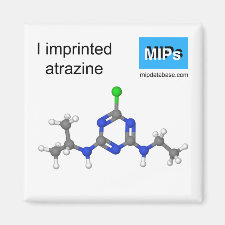
Authors: Djozan D, Ebrahimi B
Article Title: Preparation of new solid phase micro extraction fiber on the basis of atrazine-molecular imprinted polymer: Application for GC and GC/MS screening of triazine herbicides in water, rice and onion.
Publication date: 2008
Journal: Analytica Chimica Acta
Volume: 616
Issue: (2)
Page numbers: 152-159.
DOI: 10.1016/j.aca.2008.04.037
Alternative URL: http://www.sciencedirect.com/science/article/B6TF4-4SBSDHT-1/1/b3a4cfff34449f7a14677c616a5df2b4
Abstract: A simple polymerization strategy has been used to produce a monolithic solid phase micro extraction (SPME) fiber on the basis of molecularly imprinted polymer able to couple with GC and GC-MS for selective extraction and analysis of triazine herbicides. A fiber was produced by copolymerization of methacrylic acid-ethylene glycol dimethacrylate imprinted with atrazine. The effective factors influencing the polymerization have been investigated and are detailed here. At the optimum conditions the prepared fiber is firm, inexpensive, durable and thermally stable up to 280á¦C which has vital importance in SPME coupled with GC or GC/MS. In addition, the influences of pH, extraction time and temperature on the extraction efficiency of analytes were optimized. Selectivity of prepared fibers in relation to triazine herbicides and some of the other pesticide has been investigated. The high extraction efficiency was obtained for atrazine, simazine, propazine, cyanazine, ametryn, terbutryn and prometryn yielding the detection limits of 20, 70, 80, 81, 69, 88 and 68ángámL-1, respectively and the high quantities of recoveries. The reliability of prepared fiber to extraction of atrazine and other analogues in real samples has been investigated and proved by implementation of SPME in spiked samples such as tap water, onion and rice
Template and target information: triazine herbicides, atrazine, simazine, propazine, cyanazine, ametryn, terbutryn, prometryn
Author keywords: gas chromatography, solid-phase microextraction, molecularly imprinted polymer, atrazine, triazine herbicides



Join the Society for Molecular Imprinting

New items RSS feed
Sign-up for e-mail updates:
Choose between receiving an occasional newsletter or more frequent e-mail alerts.
Click here to go to the sign-up page.
Is your name elemental or peptidic? Enter your name and find out by clicking either of the buttons below!
Other products you may like:
 MIPdatabase
MIPdatabase









